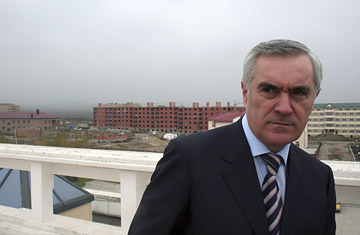
Ingush regional president, Murat Zyazikov.
Spontaneous dancing broke out in the streets Thursday night in the tiny Russian republic of Ingushetia, which borders the troubled Chechnya region. The reason for the celebration was that Moscow had accepted the "voluntary resignation" of Ingush President Murat Zyazikov. No part of the Russian Caucasus today has a political situation hotter than Ingushetia's, and no leader in the volatile region has been less effective and more embattled than Zyazikov.
Moscow had picked Zyazikov, a general of the FSB (the state security body that succeeded the KGB), in 2002 to replace then-Ingush President General Ruslan Aushev, whose "fault" had been immensely popularity among his people and his opposition to the war in Chechnya. But under Zyazikov's tenure, Ingushetia has supplanted Chechnya as the permanent hub of anti-Moscow Islamist resistance in the Caucasus. Chechen rebels now wage hit-and-run attacks from the Ingush mountains. But the lines of conflict in Ingushetia are not always simple — an increasingly bloody war of all against all pitches clans against their rivals, citizens against corrupt law-enforcers, and secret services against rebels, with all kinds of private vendettas thrown in. Kidnappings and summary executions by security services, as well as attacks on villages and military columns by militants have become the order of the day. Last year alone Russia's leading human rights group recorded 83 murders and 30 kidnappings, presumed to have been the work of security forces.
As much as Zyazikov sought to shrug off the reality of the mounting turmoil — "Those who speak of a conflict are sick; the only war is the one to develop construction sites and potato fields," he told a group of visiting journalists recently — it began to eclipse him. Opposition groups pleaded with Moscow to remove him, but Moscow is leery of removing its appointed trusties under popular pressure, seeing that as the slippery slope to "colored revolutions," such as the Orange one in Ukraine in 2004, or the Revolution of Roses in Georgia in 2003. But relying on force alone to keep unpopular stooges in office is fraught with unpredictable consequences.
Moscow's dilemma peaked last August: On his way home from the Russian capital, Zyazikov shared the flight with Magomed Yevloyev, an opposition leader and publisher of Ingushetia's only independent news outlet. A quarrel between the president and his critic broke out aboard the plane, resulting in the arrest of Yevloyev by Zyazikov's guards upon landing. Minutes later, Yevloyev died in custody as a result of an "accidental shot in the car," according to the official version.
A murderous vendetta against Zyazikov's relatives — mostly top officials of his regime — followed. Neither Zyazikov nor Russian federal forces could stem the rising tide of the rebellion, as insurgents overran entire villages, taking away local officials as hostages. Replacing the embattled president became key to Moscow's efforts to restore a semblance of stability in this key Caucasus hotspot.
Traditional Ingush respect for the military may be the reason why Moscow tapped Colonel Yunus-Bek Yevkurov, deputy intelligence department chief in the Ural and Volga military district, to replace Zyazikov. A career officer in an elite airborne regiment, he led the Russian unit that caused an international stir in 1999 by racing into Kosovo and beating NATO forces in the race to the capital, Pristina, where his troops seized control of the airport. Long removed from day-to-day Ingush political strife, Yevkurov is seen as an honest man, capable of tamping down the republic's deadly passions. Yevkurov, was appointed as "interim" leader by the Kremlin, although within 24 hours the Ingush parliament had confimed him as president. Still, Yevkurov's tenure may indeed prove to be interim measure: The Moscow political rumor mill has it that the Kremlin may be planning to re-unify Ingushetia with Chechnya, which has since 2000 been gradually pacified at a massive cost in human life.
The Ingush and the Chechens belong to the same Vainakh people, and until 1992 had constituted a single Ingush-Chechen republic. It was the Chechen drive for independence that originally split the territory; the Ingush preferred to remain part of Russia. It has taken singular political ineptitude to turn once staunchly pro-Moscow Ingushetia into a rebellious territory.
Bringing Ingushetia once again to heel may be a job coveted by Ramzan Kadyrov, Chechnya's Putin-backed strongman, who shows zero tolerance for any hint of opposition "Kadyrov has long coveted spreading his authority over Ingushetia as a springboard to extend his rule further into the Caucasus," says a politician who until recently served as top official in Chechnya. Though Kadyrov regularly denies any such ambitions, two Chechen villages recently rallied for re-unification with Ingushetia — the sort of open display of political sentiment quite impossible in today's Chechnya unless sanctioned by the authorities. The idea of creating a Vainakh "Krai" (area) accords with the Kremlin's general policy of merging Federation Units (the original 89 have been reduced to 84 through consolidation) to allow better control by the central state. But placing Ingushetia under Kadyrov's iron heel could simply pour gasoline on the Ingush fires, and risk escalating the conflict into a new, messy flare-up along Russia's southern underbelly.
